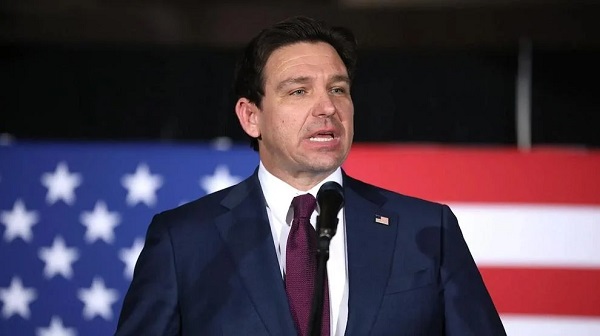Business
UN’s COP29 conference pledges $300 billion a year for ‘climate change’ in third world nations to help them transition to alternative energy

COP29 International Climate Change Event Concept. Baku, Azerbaijan
From LifeSiteNews
The deal may already be moot with Donald Trump returning to the White House
The international COP29 conference finished over the weekend with multinational pledges to spend billions of dollars over the next decade combating “climate change” in third world nations, amid expectations that the agreement will be rendered moot by former President Donald Trump’s return to the White House.
Just the News reports that the conference, among the almost 200 nations who signed onto the United Nations Framework Convention on Climate Change in 1992, ended with a mutual commitment to spend $300 billion every year until 2035 helping poor countries mitigate the so-called effects of “climate change” and transition to alternative energy.
India representative Chandni Raina wanted the conference to commit to $1.3 trillion a year, and lamented $300 billion as “abysmally poor” and a “paltry sum” that would not suffice to “address the enormity of the challenge we all face.”
Another group in attendance, the America-based Committee For A Constructive Tomorrow (CFACT), had a very different conclusion, as CFACT dissents from the green agenda of the international establishment.
“Nations such as China and India are given a pass on emissions reductions and paying out funds,” noted CFACT’s Craig Rucker. “This, despite the fact that China is the world’s number one emitter of greenhouse gases and boasts the second largest economy, while India’s economy is all the way up at number five.”
Regardless, the conference’s deliberations may already be moot, as Trump is widely expected to withdraw the United States from the Paris Climate Agreement upon resuming office in January, which in turn would eliminate America’s share of the funding for COP29.
Trump formally pulled out of the Paris accords in August 2017, the first year of his first term, with then-U.S. Ambassador to the United Nations Nikki Haley stating that the administration would be “open to re-engaging in the Paris Agreement if the United States can identify terms that are more favorable to it, its business, its workers, its people, and its taxpayers.”
Such terms were never reached, however, leaving America out until Trump’s successor, outgoing President Joe Biden, re-committed the nation to the Paris Agreement on the first day of his presidency, obligating U.S. policy to new economic regulations to cut carbon emissions.
In June, the Trump campaign confirmed Trump’s intentions to withdraw from Paris again. At the time, Trump’s team was reportedly mulling a number of non-finalized drafts of executive orders to do so.
Left-wing consternation on the matter is based on certitude in “anthropogenic global warming” (AGW) or “climate change,” the thesis that human activity, rather than natural phenomena, is primarily responsible for Earth’s changing climate and that such trends pose a danger to the planet in the form of rising sea levels and weather instability.
Activists have long claimed there is a “97 percent scientific consensus” in favor of AGW, but that number comes from a distortion of an overview of 11,944 papers from peer-reviewed journals, 66.4 percent of which expressed no opinion on the question; in fact, many of the authors identified with the AGW “consensus” later spoke out to say their positions had been misrepresented.
AGW proponents suffered a blow in 2010 with the discovery that their leading researchers at the Intergovernmental Panel on Climate Change, East Anglia Climate Research Unit, and National Oceanic and Atmospheric Administration had engaged in widespread data manipulation, flawed climate models, misrepresentation of sources, and suppression of dissenting findings in order to make the so-called “settled science” say what climate activists wanted it to.
Business
COP30 finally admits what resource workers already knew: prosperity and lower emissions must go hand in hand

From Resource Works
What a difference a few weeks make
Finally, the Conference of the Parties to the UN climate convention (COP30) adopted a pragmatic tone that will appeal to the working class. Too bad it took thirty meetings. Pragmatism produces results, not missed targets.
We should not have been surprised. Influential figures like Bill Gates and Canadian-Venezuelan analyst Quico Toro, who have long argued that efforts to reduce CO₂ should focus more on technology and prosperity, and less on energy consumption and declining growth, have gained ground.
In the World Energy Outlook 2025, prepared by the International Energy Agency for COP30, you can see that many of the views held by the people above had already gone mainstream before the conference started.
The World Energy Outlook 2025 lays out three scenarios: Current Policies (CPS), Stated Policies (STEPS), and Net Zero Emissions by 2050 (NZE). In WEO 2025, all three scenarios reflect longer timelines for the decline of fossil fuels than in earlier editions, and the NZE pathway explicitly states that major technological breakthroughs will be required.
Unfortunately, many potential technologies are adamantly opposed by the loudest groups within the Climate Change Movement because they are not perfect. Even some continue to oppose nuclear power, one of the few proven sources of large-scale, zero-carbon, firm electricity.
Another noteworthy standout in WEO 2025 was the strong recognition that energy security, costs, and supply chains are now the primary considerations in determining each country’s energy mix.
What all this means is we are breaking away from emotionally charged, fear-based policies and rhetoric and moving toward a practical “let’s do things better” approach.
For 30 years, the radical leadership of the environmental movement has focused on what we should stop doing and on sacrificing prosperity. Essentially, what has been going on is an attack on working people in the industrialized and developing world.
Today, workers in the developed world are so anxious that many are losing faith in democratic institutions. Meanwhile, people in the emerging and developing world see light at the end of the tunnel and are determined to industrialize.
Clearly, it is time to merge the fight to lower CO₂ emissions with prosperity. “Let’s do things better” captures the history of human progress and resonates with working people today.
What does it take for longer, healthier, safer, and more sustainable lives? It takes the pragmatism of workers. They spend their lives striving to improve workplace safety, to develop tools that enable them to perform tasks more effectively with less physical effort, to earn higher pay, to produce more food with less land, and to preserve their opportunity to continue working.
Resource workers have felt under attack and are humiliated when celebrities fly in on a helicopter to denigrate their work and make references to the virtues of small-plot gardening, or politicians who tell them to go back to school for “jobs of the future”, only to find themselves in low-paying service jobs.
As the COP30 discussion indicates, we have reached a turning point. It is time to focus on doing what needs to be done, but doing it better. It is time to stop banning activities entirely as though circumstances and technology never change. Demanding perfection hides what is possible, slows progress and, in some cases, stops it altogether.
Bill Gates’ memo to COP30 points to the turn in the road:
“We should measure success by our impact on human welfare more than our impact on the global temperature, and our success relies on putting energy, health, and agriculture at the centre of our strategies.”
Gates also makes a point that will resonate with working people: “Using more energy is a good thing because it is closely correlated with economic growth.” Ironically, a statement made by a billionaire resonates with working people more than does the message of many climate activists.
The work at the Port of Prince Rupert comes to mind, given its growing role in supplying cleaner cooking and heating fuels, when we are reminded that 2 billion people worldwide cook and/or heat their homes with highly polluting open fires (wood, charcoal, dung, agricultural waste).
Persuasion published Quico Toro’s essay on November 13, 2025, which speaks another truth.
“COP imagines these emissions as something a country’s government can set, like the dial on a thermostat. But emissions are more like GDP: the outcome of a complex process that politicians would like to be able to control, but do not actually control.”
I am feeling more secure about the future here in Canada and BC, as governments, First Nations and the public are leaning into climate and economic pragmatism.
There will be hard discussions and uncomfortable trade-offs. Past decisions need to be re-examined in good faith. Do they meet today’s demands? Are we doing what needs to be done better? Is it the right move for today’s youth and future generations? Will we bring back the hope and opportunity of a growing middle class?
Nobody, not the Liberal government, the BC NDP government, First Nations, none of us would have predicted the world we are facing today, where our economy and sovereignty are challenged.
Today, oil, natural gas, and critical minerals, not one or two but all three, are the financial backstop Canada needs, as we rebuild the economy and secure our sovereignty.
Look West: Jobs and Prosperity for Stronger BC and Canada is as much of an admission that we are falling behind as it is a call to action. Success will take billions of dollars, the exact amount unknown.
But what we do know is that oil, gas, and critical minerals generate the most public revenue, the highest incomes, and are our most significant exports. They are Canada’s bank and comparative advantage. They will provide the cash flow needed to get it done.
Not maximizing oil production and exports is fighting with both hands tied behind our back. We all know it; now we need to focus on doing it better because circumstances have changed dramatically.
Jim Rushton is a 46-year veteran of BC’s resource and transportation sectors, with experience in union representation, economic development, and terminal management.
Resource Works News
Business
Canada’s recent economic growth performance has been awful

From the Fraser Institute
By Ben Eisen and Milagros Palacios
Recently, Statistics Canada released a revision of its calculations of Canada’s gross domestic product (GDP) in recent years. GDP measures the total production in an economy in a given year, and per-person GDP is widely accepted by economists as one of the most useful metrics for assessing quality of life. The new estimate places Canada’s GDP for 2024 at 1.4 per cent larger than previously reported.
By the standards of these sorts of revisions—which are usually quite small—the recent update is significant. But make no mistake, the new numbers do not change the fundamental story of Canada’s economic performance, which has been one of historically weak growth and stagnant living standards for an unusually long stretch of time.
Let’s get into the numbers (all adjusted for inflation, in 2017 dollars) with some historical perspective. The new figures put Canada’s per-person GDP estimate for 2024 at $59,529. By comparison, in 2019 per-person GDP was slightly higher at $59,581. This means there has been no progress at all in Canadian living standards as measured by per-person GDP over the past five years. Even with the revision, five years of flat living standards is an extraordinary result.
This is historically anomalous. From 2000 to 2018—a period that was itself not especially strong by the standards of earlier decades—per-person GDP still grew at a compounded annual rate of just under one per cent. In the 1990s, growth was faster still at roughly 1.8 per cent annually. In both periods, living standards were rising meaningfully, even if the pace varied. The fact that they have completely stagnated for five years is alarming, even if our GDP numbers aren’t quite as bleak as we believed a few weeks ago.
Some pundits determined to view all economic data through a political lens have emphasized that under the new revisions, the overall rate of per-person growth during Justin Trudeau’s time as prime minister is now approximately the same as what occurred during Stephen Harper’s tenure.
However, this is more relevant as a political talking point than an economic insight. The historical data show that at an average annual growth rate of just 0.5 per cent, the Canadian economy’s performance under Harper was weak by long-term standards. This is something that Trudeau himself recognized when he first sought high office, criticizing the Harper government for “having the worst record on economic growth since R.B. Bennett in the depths of the Great Depression.”
Trudeau was right back then that Canadian economic growth during the Harper era was historically weak. As such, a revision showing that Canada’s slow growth has approximately continued for the past decade is hardly cause for celebration. It simply underscores that both governments presided over a long period of weak productivity growth and very slow improvements in living standards—and that in recent years even that sluggish growth has given way to complete stagnation.
Of course, an upward revision to recent GDP calculations is welcome news, but it must not be allowed to distract policymakers or the public from the reality of Canada’s severe long-term growth problem, which in recent years has gone from bad to worse.
-

 Great Reset2 days ago
Great Reset2 days agoViral TikTok video shows 7-year-old cuddling great-grandfather before he’s euthanized
-

 Daily Caller2 days ago
Daily Caller2 days agoChinese Billionaire Tried To Build US-Born Baby Empire As Overseas Elites Turn To American Surrogates
-

 Alberta2 days ago
Alberta2 days agoSchools should go back to basics to mitigate effects of AI
-

 International2 days ago
International2 days agoAt Least 15 Killed In Shooting Targeting Jewish Community At Australia’s Bondi Beach, Police Say
-

 International2 days ago
International2 days agoTwo states designate Muslim group as terrorist
-

 Business2 days ago
Business2 days agoMajor tax changes in 2026: Report
-

 Digital ID1 day ago
Digital ID1 day agoCanada releases new digital ID app for personal documents despite privacy concerns
-

 Bruce Dowbiggin1 day ago
Bruce Dowbiggin1 day agoNFL Ice Bowls Turn Down The Thermostat on Climate Change Hysteria






